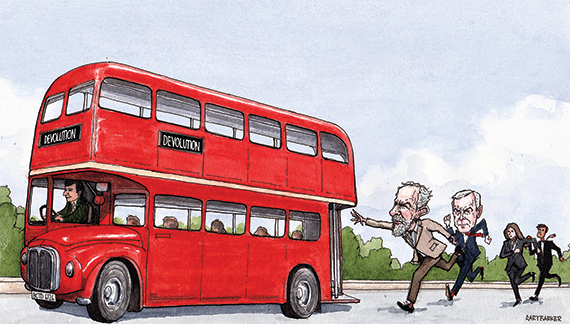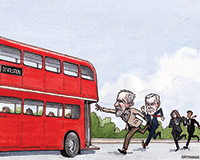 Jeremy Corbyn’s vision of 21st century “municipal socialism” will not empower places to meet the challenges they face.
Jeremy Corbyn’s vision of 21st century “municipal socialism” will not empower places to meet the challenges they face.
After a summer of discontent and a protracted leadership contest, delegates at last week’s Labour conference were understandably keen to focus on the party’s future, and how it can take on the Conservatives at the next general election.
Amid debates about renewing the party’s position on issues such as austerity, immigration, patriotism and Brexit, one theme that came up repeatedly at fringe events was how the party could start to rebuild trust and support across the country by setting out a radical programme for devolution.
Labour, after all, has a strong record in this area, with the creation of devolved assemblies in Scotland, Wales and Northern Ireland still regarded as among the biggest successes of the Blair government.
Yet the party has been outflanked on this issue by the Conservatives in recent years, with former chancellor George Osborne championing a bold agenda for devolution in major city regions across England, including the introduction of new metro mayors in May 2017.
However, with Theresa May’s government seemingly hesitant about giving its full backing to devolution, Labour had a prime opportunity to steal a march on the Conservatives by seizing the cities and devolution agenda and putting it at the heart of party policy.
Some of the ideas outlined by Corbyn in his conference speech would undoubtedly help to drive economic growth. The Labour leader was right, for example, to emphasise the need to boost research and development, improve skill levels and invest in transport, while his pledge to allow councils to borrow to build more homes would help places unlock more of the funding they need to address housing shortages.
Yet while Corbyn listed at length the achievements of Labour councils across the country, there was a distinct lack of policies to help those councils make their own decisions about how to meet the challenges they face (housing aside).
For example, Corbyn missed the chance to set out plans to enable city regions to retain local tax revenues for investment in jobs and growth – something that many Labour council leaders have called for.
Rather than outlining an ambitious vision to hand places and people more powers, most of Corbyn’s proposals to change the country represent a much more top-down, centralised approach to policy-making – from his plans for a national education service, to promises to renationalise the railways.
To some extent, this reflects a long-standing tendency in the Labour party about ensuring that there are uniform standards across the country, and avoiding postcode lotteries. Yet with growing interest from people in having greater local influence, Labour cannot afford to view local government as primarily a platform to deliver its big national policy priorities.
And so, as we look back on the conference, there is a sense that Labour is no closer to offering a bold vision for devolution than before. Corbyn may have failed to seize the opportunity, but May might not.
Alexandra Jones is chief executive of Centre for Cities











